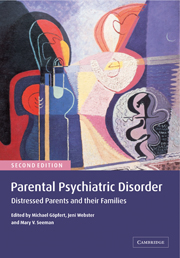Crossref Citations
This Book has been
cited by the following publications. This list is generated based on data provided by Crossref.
Cowling, Vicki
Edan, Vrinda
Cuff, Rose
Armitage, Paul
and
Herszberg, Dassi
2006.
Mental Health Consumer and Carer Participation in Professional Education: ‘Getting There Together’ for Children of Parents with Mental Illness and Their Families.
Australian Social Work,
Vol. 59,
Issue. 4,
p.
406.
Singleton, Laura
2006.
Adam: a case study of a young person's journey through madness.
British Journal of Nursing,
Vol. 15,
Issue. 13,
p.
722.
Webster, Jeni
2007.
Commentary–‘Training psychiatric teams to do family systems acute psychiatry’ and ‘Developing family‐inclusive mainstream mental health services’.
Journal of Family Therapy,
Vol. 29,
Issue. 1,
p.
44.
Riebschleger, Joanne
2007.
Review of Daughters of madness: Growing up and older with a mentally ill mother..
Psychiatric Rehabilitation Journal,
Vol. 31,
Issue. 1,
p.
83.
Turk, Jeremy
2007.
Behavioural phenotypes: their applicability to children and young people who have learning disabilities.
Advances in Mental Health and Learning Disabilities,
Vol. 1,
Issue. 3,
p.
4.
Singleton, Laura
2007.
Parental mental illness: the effects on children and their needs.
British Journal of Nursing,
Vol. 16,
Issue. 14,
p.
847.
Slack, Karin
and
Webber, Martin
2008.
Do we care? Adult mental health professionals' attitudes towards supporting service users' children.
Child & Family Social Work,
Vol. 13,
Issue. 1,
p.
72.
Byng‐Hall, John
2008.
The significance of children fulfilling parental roles: implications for family therapy.
Journal of Family Therapy,
Vol. 30,
Issue. 2,
p.
147.
Grant, Gordon
Repper, Julie
and
Nolan, Mike
2008.
Young people supporting parents with mental health problems: experiences of assessment and support.
Health & Social Care in the Community,
Vol. 16,
Issue. 3,
p.
271.
Hosman, Clemens M H
van Doesum, Karin T M
and
van Santvoort, Floor
2009.
Prevention of emotional problems and psychiatric risks in children of parents with a mental illness in the Netherlands: I. The scientific basis to a comprehensive approach.
Australian e-Journal for the Advancement of Mental Health,
Vol. 8,
Issue. 3,
p.
250.
Cox, John
and
Barton, Joanne
2010.
Parenthood and Mental Health.
p.
217.
Monds-Watson, Aisling
Manktelow, Roger
and
McColgan, Mary
2010.
Social Work with Children when Parents have Mental Health Difficulties: Acknowledging Vulnerability and Maintaining the “Rights of the Child”.
Child Care in Practice,
Vol. 16,
Issue. 1,
p.
35.
van der Zanden, Rianne AP
Speetjens, Paula AM
Arntz, Karlijn SE
and
Onrust, Simone A
2010.
Online Group Course for Parents With Mental Illness: Development and Pilot Study.
Journal of Medical Internet Research,
Vol. 12,
Issue. 5,
p.
e50.
Drost, Louisa M.
Cuijpers, Pim
and
Schippers, Gerard M.
2011.
Developing an interactive website for adolescents with a mentally ill family member.
Clinical Child Psychology and Psychiatry,
Vol. 16,
Issue. 3,
p.
351.
Östman, Margareta
and
Afzelius, Maria
2011.
Children’s Representatives in Psychiatric Services: What Is the Outcome?.
International Journal of Social Psychiatry,
Vol. 57,
Issue. 2,
p.
144.
Griffiths, Jennifer
Norris, Emma
Stallard, Paul
and
Matthews, Shane
2012.
Living with parents with obsessive–compulsive disorder: Children's lives and experiences.
Psychology and Psychotherapy: Theory, Research and Practice,
Vol. 85,
Issue. 1,
p.
68.
Cowling, Vicki
and
Garrett, Matthew
2012.
A Child‐inclusive Family Intervention in a Community Adult Mental Health Service.
Australian and New Zealand Journal of Family Therapy,
Vol. 33,
Issue. 2,
p.
101.
Davidson, Gavin
Duffy, Joe
Barry, Liz
Curry, Patsy
Darragh, Eithne
and
Lees, Judith
2012.
Championing the interface between mental health and child protection: evaluation of a service initiative to improve joint working in northern Ireland.
Child Abuse Review,
Vol. 21,
Issue. 3,
p.
157.
Bee, Penny
Berzins, Kathryn
Calam, Rachel
Pryjmachuk, Steven
Abel, Kathryn M.
and
García, Antonio Verdejo
2013.
Defining Quality of Life in the Children of Parents with Severe Mental Illness: A Preliminary Stakeholder-Led Model.
PLoS ONE,
Vol. 8,
Issue. 9,
p.
e73739.
Van Parys, Hanna
and
Rober, Peter
2013.
Trying to Comfort the Parent: A Qualitative Study of Children Dealing With Parental Depression.
Journal of Marital and Family Therapy,
Vol. 39,
Issue. 3,
p.
330.



